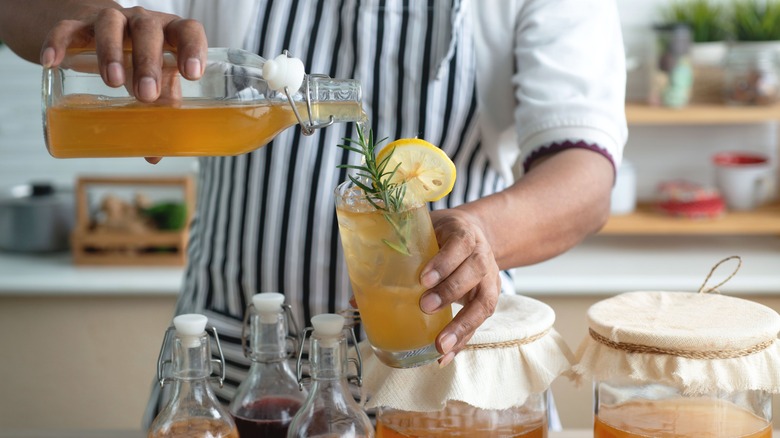The Real Reason You Might Feel Sick When Drinking Kombucha
According to Healthline, kombucha is a fermented tea that is plentiful in health benefits and is thought to have origins in China or Japan. Kombucha is rich in polyphenols and antioxidants, and may help kill bacteria, reduce heart disease risk, detox the liver, manage type 2 diabetes, and protect against cancer. As a probiotic, kombucha is also key for good gut health. Improved digestion, reduced inflammation and IBS symptoms, and weight loss have all been connected to probiotics.
With such promising perks, it's no wonder why its popularity has grown over recent years, but — as with any food or beverage — kombucha does have potential side effects. Because kombucha is made from bacteria and yeast and can be homemade under non-sterile conditions, per Mayo Clinic, you could get sick with stomach problems such as nausea and vomiting, which have been reported as side effects of drinking kombucha. Some containers can also have toxic chemicals.
Tips for safely drinking kombucha
If you enjoy making your own kombucha, Medical News Today recommends using a container that won't break down or cause chemicals or metals to seep into the beverage. Using a glass container is best. Even if it's brand new, take the extra step to sanitize it for added protection.
Also, be mindful of the temperature to prevent contamination from other microbes. Cultures for Health says to brew the kombucha between 68 to 78 degrees Fahrenheit. The warmer the temperature, the quicker the kombucha cultures. You can brew it as hot as 85 degrees, though that will make the kombucha taste stronger.
While there isn't a standard recommendation on how much kombucha you should or shouldn't drink, up to one or two cups per day is suitable. Just pay attention to how your body responds, like you would when trying any new food or drink. Food Network recommends paying attention to the amount of calories, sugar, and alcohol your chosen kombucha brand contains. Typically, they range from 30 to 50 calories per 8 ounces. Look for brands that use 100% fruit juice and don't exceed 12 grams of added sugar.
Kombucha isn't an alcohol product like wine or beer and can actually be a great alternative for non-drinkers, but it does contain trace amounts of alcohol from the fermentation process. Typically, kombucha has just half an ounce ABV per serving, but there are some true alcoholic options known as hard kombucha that can have 3% ABV.


